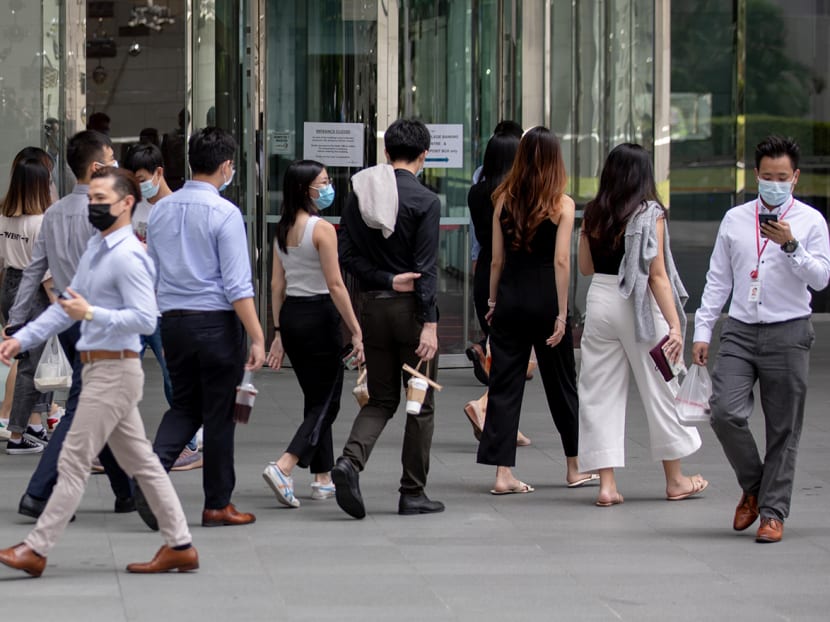Unvaccinated workers count cost of not getting jabbed as Covid-19 workplace rules loom
SINGAPORE — Some workers who have not been vaccinated against Covid-19 feel like they are in limbo as they wait to see what vaccine differentiated rules their employers might introduce, such as making them pay for regular testing.

Some unvaccinated workers said that they were willing to quit their jobs if the Covid-19 rules applying to them were too stringent.
- An advisory from tripartite partners urged all employers here to ensure workers are either vaccinated or tested regularly
- Employers could ask medically eligible unvaccinated workers to pay for tests
- Some unvaccinated workers TODAY spoke to believe the rules are discriminatory
- Others are prepared to quit their jobs and find new ones if the rules become too stringent
SINGAPORE — Some workers who have not been vaccinated against Covid-19 feel like they are in limbo as they wait to see what vaccine-related rules their employers might introduce, such as making them pay for regular testing.
Some of them told TODAY that they are prepared to hand in their resignations and find other jobs should the rules become too stringent.
Earlier this week, Singapore’s tripartite partners had issued an advisory on how bosses can keep their workplaces safe from Covid-19.
Among other things, it urged all employers here to adopt a regime that either sees their workers fully vaccinated against Covid-19 or requires unvaccinated employees to undergo regular testing.
It added that bosses may require those who are medically eligible but not vaccinated to pay costs relating only to unvaccinated employees. This includes the costs of test kits and accommodation for serving stay-home notice.
Employers previously told TODAY that they were generally supportive of the guidelines to keep workplaces safe from the disease, and most would ask their unvaccinated employees to bear the costs of the tests.
One finance sector worker, who wished to be known only as Mrs Lee, said that her boss told her she cannot return to the office because she is not vaccinated and will have to work from home until she does.
The 39-year-old said that she does not want to get vaccinated because she is concerned about the possible long-term side effects of Covid-19 vaccines.
“I feel that vaccination status should not be used in this aspect to deem who is worthy to work in the office,” she said.
‘UNCLEAR’ WHY RULES NEEDED
Administrative executive Tan Yi Han, 35, is hoping that the authorities can provide more clarity on why such vaccine-related measures are needed in the workplace though his employer has not yet introduced such rules.
He is choosing not to get vaccinated because he believes that boosting his immune system is the best defence since most people who get infected here have no or mild symptoms.
Mr Tan also pointed to the Covid-19 cluster at the Mindsville@Napiri housing facility for people with intellectual disability in June this year where most of the infected individuals were fully vaccinated.
The authorities said that the low rate of symptomatic Covid-19 disease in the outbreak there was likely caused by the high vaccination levels among staff members and residents.
Young people have been urged to get vaccinated partly because it reduces the risk that they will spread the virus to vulnerable people such as older relatives.
‘NOT OUR CHOICE’
Analyst Diana, 25, who also declined to reveal her full name, said she was told that all employees, regardless of vaccination status, are required to return to the office by next week.
Her company’s human resource department said on Thursday that she would not be allowed to join any mask-off gatherings such as having lunch with her colleagues.
“I have to eat at my table, not even at the pantry,” she said. “I wouldn't say I feel discriminated per se because it's kind of necessary, I guess? But maybe slightly sad.”
Diana is not fully vaccinated after suffering an allergic reaction of rashes on her upper back after receiving her first dose of the Pfizer-BioNTech vaccine in July. She was turned away from taking her second dose at the vaccination centre after revealing this information there.
People suffering allergic reactions to messenger ribonucleic acid (mRNA) vaccines such as Pfizer-BioNTech have the option of using other World Health Organization-approved vaccines such as Sinovac.
Earlier this month, MOH said that the initial 200,000 doses of the Sinovac vaccine here have been allocated and new stock is expected to arrive in the next four to six weeks.
Besides the 170,000 doses allocated to private healthcare institutions, the remaining 30,000 doses have been reserved for Singaporeans, permanent residents and long-term pass holders who had allergic reactions to the mRNA vaccines, and for other purposes.
Diana said that she has not been informed of any other measures that her company will implement for those who are unvaccinated and is “slightly worried”.
“(It’s) unfair if unvaccinated people have to pay to get tested when it's not our choice that we're not vaccinated,” she said. The advisory stated that those who are medically ineligible for vaccination should not be required to pay for costs such as tests.
As Diana’s current role is not customer-facing, she doubts that she will be redeployed.
A swab assistant at a private medical firm named Aishah, 24, who also declined to reveal her full name, suffered an allergic reaction after her first Pfizer-BioNTech shot in January.
She said that it is “really frustrating” that these rules could be set “because it’s really not my fault that I’m allergic”.
“I have zero allergies and the Pfizer jab is my first ever allergy. If I could, I would be vaccinated. That’s why I took the vaccination once it came out. And the fact that I may have to worry about my job because I’m not vaccinated is really frustrating.”
Owing to the nature of her job, Aishah is already required to get tested every two weeks.
“My employers have not spoken to me about being redeployed. I have no issues taking swabs but I do have an issue if I have to start worrying about my job stability,” she said.
“I can’t help it that there is no Sinovac stock in Singapore now, right? So if they were to be completely out of stock for months, are we supposed to be stuck at home if employers in Singapore start to disallow unvaccinated employees from working?”
One finance industry worker who is in his 60s also expressed his interest in taking Sinovac, an inactivated-virus vaccine, and is waiting for the new stocks to arrive. This type of vaccine uses traditional technology unlike the new mRNA vaccines.
“In my mind, it’s the safer vaccine. My preference is the traditional vaccine. If you look at all the side effects from all the mRNA vaccines, you are asked to then take Sinovac because Sinovac is safer. That’s the irony, right?” he said.
While he is not aware if his workplace will execute any of the measures set out in the advisory, he said that the rules have “no basis” and are “discriminatory”.
“What’s the rationale? Today, whether you're vaccinated or unvaccinated, you face the same risk of being infected,” he added.
Numerous studies have shown that the risk of infection is reduced for vaccinated individuals.
He continued: “I might even argue that vaccinated people are more dangerous because they have the mistaken belief that because of vaccination, they can go out and start going all over the place, and they become a huge source of infections."
He noted that employers have been told not to discriminate workers based on race, age, sex and marital status during hiring. "But at the same time, they make this kind of discrimination. We are totally at odds. This is all wrong.”
READY TO RESIGN
Though their employers have not officially announced the full suite of vaccine-related measures they plan to introduce, some of the unvaccinated workers told TODAY that they were prepared to quit their jobs and find new ones if the rules became too stringent.
Mrs Lee, the finance sector worker, said that even though she has worked at her current job for 10 years and it pays well, she would resign if her employer requires her to take frequent Covid-19 tests and pay for them herself.
“It’ll be unbearable if I have to pay for the tests regularly out of my own pocket. I don’t see why I should when it should be the vaccinated workers who should be tested regularly because they may not show symptoms of having Covid-19 and hence pose a bigger threat.”
Another worker from the non-profit sector, who wanted to be known only as Mr Chan, 41, said that he is prepared to negotiate with his employer when the company requires unvaccinated people to get tested regularly from October.
He opposes the testing regime because he is believes that the chemical ethylene oxide used to make Covid-19 tests is carcinogenic and harmful to humans, though scientists have said that all residue of the chemical is removed from the tests before they can be used, and they have been rigorously tested to be safe to use.
Mr Chan also believes that it is unfair to place the burden of costs of the tests on unvaccinated workers, especially low-wage earners.
He is willing to be redeployed or have his job redesigned if that is what it takes to be exempted from the testing regime.
However, if his employer refuses to budge, Mr Chan said that he would quit his job and find a new one.
“When we signed our employment contract with the company, it did not state or cover all these rules. Of course, that was pre-Covid… Still, how can we now be expected to subject ourselves to all these (new rules)?”













